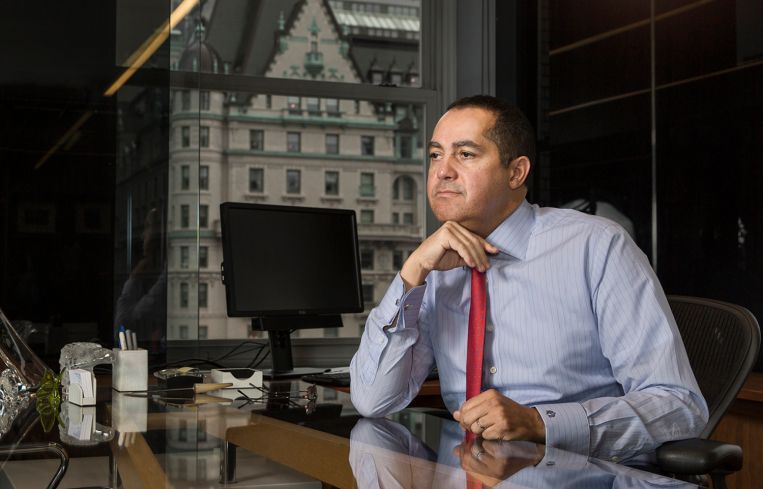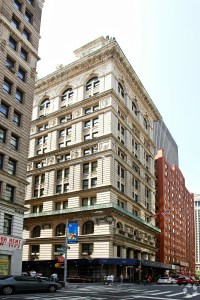Don Peebles Talks Miami and Why He’s Seriously Thinking About a Run for Mayor of NYC
By Liam La Guerre December 9, 2015 9:00 am
reprints
Real estate developer Roy Donahue “Don” Peebles Jr. made headlines recently, but not for one of the multimillion dollar developments Peebles Corporation is building in Miami or New York.
It was for lambasting Mayor Bill de Blasio, whom Mr. Peebles once supported, saying that he was considering a Democratic mayoral run of his own to replace de Blasio.
“I’ve lost confidence in him,” Mr. Peebles told The New York Post in August. “It would be irresponsible of me to do nothing.”
Mr. Peebles, 55, grew up in Washington, D.C., but currently lives on the Upper West Side (he also has homes in D.C., Miami and the Hamptons). He dropped out of the pre-med program at Rutgers University after his freshman year, opting to work as real estate broker and appraiser in his hometown. He founded Peebles Corporation in 1983 as a consulting firm and began developing in 1986.
But over time, he forged a great family business, becoming one of the biggest African-American developers in the country. His wife of 23 years, Katrina, is the creative director, and his son, 21-year-old son R. Donahue III, a senior at Columbia University, works as a development associate at the company. (Mr. Peebles also has a 13-year-old daughter, Chloe. No word yet on what role she’ll have.)
Today he is worth about $700 million, according to Forbes, and his company has $3.5 billion worth of active developments nationwide, Mr. Peebles said. That includes the 419,000-square-foot building at 346 Broadway, which is the former New York Life Insurance Company Building in the Civic Center area of Manhattan. Peebles Corporation purchased the office building in 2013 for $130.4 million from the city, and is currently converting it into a luxury residential condominium. It was the single largest building sale in the history of New York City Economic Development Corporation, as Commercial Observer reported, and

marked the company’s first project in New York City.
While managing his 130-person company, Mr. Peebles has long had his eye on politics, as well, including stints on the finance committees for former and current Presidents Bill Clinton in 1992 and Barack Obama in 2008. But it all started way before.
Commercial Observer: There has been a lot of talk of you getting into politics lately. What kind of relevant experience do you have?
Mr. Peebles: My last two years of high school I was a page on Capitol Hill. So I worked on the floor of the House of Representatives. So I got a great deal of experience on the political side on Capitol Hill in high school and I got a good sense of how government worked and so forth.
What was the most interesting experience you had as a page?
My graduation ceremony [from page school]. [Actually,] I had two ceremonies. The first was in the morning in the rose garden at the White House. President [Jimmy] Carter gave us certificates of achievement in appreciation for serving as pages and we got to bring guests to the rose garden. So that was really great.
Where was the second graduation ceremony?
There was another one in the Cannon [House Office] Building. It was a really nice ceremony. Our prom was in the botanical gardens. [Page] school had about 100 to 150 kids at any given time and they would be from all over the country. And then each week we had an assembly at school and a different member of Congress would come to speak. So we had Barbara Jordan, Shirley Chisholm [and] Ted Kennedy. They would come and speak and then there would be a Q&A. So it was an amazing experience.
So your political credentials started then?
In fact, even before that. I volunteered for a Washington, D.C. city council candidate, Marion Barry, who ultimately became the mayor of the city.
How old were you when you volunteered for Mr. Barry?
Fourteen. When I came back from Rutgers in 1980, I worked as a broker and then as an appraiser. Mr. Barry had become mayor in 1979 and ran for re-election in 1982 and at that point I got engaged in the campaign. I held a couple of events for him and then he got re-elected. And when he was building his new administration after being elected, I got appointed to the Board of Equalization and Review, and the following year I was named chairman. I became the youngest cabinet-level member of his administration. I was 24. So I was chairing the most influential board for real estate in the city. So that was kind of the beginning of my emergence as a major player in the real estate and the political world in D.C.
What do you make of the Sheldon Silver case? [This interview was conducted before Mr. Silver’s conviction; Mr. Peebles has not donated to Mr. Silver at least in the past 10 years.]
I think the challenge you got is [that] these jobs for assembly members and speaker are part-time. So they allow outside income. And from what I have seen in environments where outside income is allowed or the elected office is part-time, the lines could be blurry.
Do you think that outside income should be disallowed?
People are either honest or they are dishonest. If they are going to try to abuse the system or be dishonest, they are going to figure out ways to be dishonest. I think you can get rid of a lot of perception by making some adjustments. I think the speaker of the City Council, the speaker of the Assembly, the president [pro tempore] of the Senate, those positions should be full-time jobs.
Political donations from big real estate companies spiraled downward in New York after the Silver case began. Do you think that will remain the case for the rest of the election cycle?
I can tell you that for us, as a company, it’s rare that we make a contribution to anyone that we don’t have more of a personal connection with.
So you knew Bill de Blasio before you supported his campaign for mayor?
I met him before I did any business in New York City. I met him and [his wife] Chirlane [McCray] because a political consultant whom I knew in Washington, D.C. said that I should meet one of his clients, who is a very interesting person and his wife is very interesting. He said that I should meet them especially if I was giving any consideration to going into politics at some point. I ended up being in New York and having dinner with Chirlane and Bill. He was in the City Council, so it was seven years ago, something like that. We had a nice conversation and over time we began to develop a relationship.
What did you like about de Blasio’s policies?
I made a decision to support de Blasio because he was talking about an issue that I thought was critical, that we have more and more New Yorkers who are not having equal access to opportunity. He phrased it as it was a tale of two cities and that there is income inequity. I don’t believe in the concept necessarily of income inequity. I believe in the concept of opportunity inequity. There is inequity in access to a good, solid public education for hundreds of thousands of New York kids. And there is tremendous inequity in terms of economic opportunity and so de Blasio acknowledged and highlighted that that was an issue and he was willing to discuss that issue head-on.
Why have you been critical of him recently?
I think that he has proven to be ineffective. He has been in office for nearly two years, and in terms of income inequity he has done nothing to improve that. The city awards about $17 billion of contracts annually, and this past fiscal year that ended in June the city did 4 percent of its business with minority- and women-owned businesses. If you break it down, three-tenths of 1 percent to African-American-owned businesses and African-Americans represent about 26 percent of the population in the city. Six-tenths of 1 percent to Latino-owned businesses and they represent 29 percent of the population. So collectively 55 percent of the population is getting less than 1 percent of the economic opportunities. That is not fair. It’s just absolutely wrong and there is no excuse for that kind of performance.
Are there any other reasons why you aren’t supporting him?
Then you look at the quality of life here. He ran on a campaign to end stop-and-frisk. The reality is that a federal judge ended stop-and-frisk—[Mr. de Blasio] didn’t end it.
He was going to come up with a plan to deal with one of the biggest issues facing New York, which is the cost of housing. And that ever rapidly increasing cost continues to make New York less and less affordable and less competitive to people who are in this city, so it forces people out of this city. So he failed to deal with affordable housing. I look at these things and I say, “What is going on here?” And I have had countless conversations with him and he comes up with no solutions, just excuses. So what I realize is, Bill is being who he is. He is a political strategist. He is not a chief executive. He has never run any business of any consequence. His last job as public advocate, he managed an office budget of $1.6 million. The average Duane Reade store does $6.7 million of business in New York City. I do not believe he is competent to run the city. And I believe that his poor leadership skills and his lack of basic common knowledge of how business is done has shown itself. His [polling] numbers are so bad, they are worse than mayors of other cities who have had major scandals.
How serious are you considering a run for mayor of New York City?
Very. I think [former Mayor] Mike Bloomberg showed that giving back is important and it could be effective. I think what has happened is you get public service from people who have careers in nonprofits, education and activism. They will go and serve, but too few of us in the business sector are willing to go in and serve. But we have a lot of management skills and this is a big business. New York City is a very big business. It’s an $80-billion-a-year government with 325,000 employees and 34,000 police officers.
How would you as mayor address the housing crisis, which you believe that de Blasio has so far failed to solve?
I would recognize that the government is never going to be able to provide sufficient affordable housing to cover the demand. It would bankrupt the entire government to try to do that. It’s not possible. So it’s an issue that has to be dealt with through the private sector and it has to be dealt with through a commodity that is not going to cost the tax-paying public money and take money from other things like education, public safety and cleanliness of the city. I would incentivize private development through land-use bonuses. I would eliminate 421a. In high-density areas we would add density. I would offer a developer a 60 percent FAR [floor area ratio] bonus, provided that 50 percent of that increase, so 30 percent, went to affordable housing and then the other 30 percent is market-rate housing.
When did you start looking to do real estate deals in New York City?
We started looking at real estate deals in New York around 2005 to 2006. In the first deal that we [almost] did here, we were on the team that was initially awarded the rights for the Aqueduct casino. It was Delaware North and our company. And that was in 2008. And then the financial market crashed and our financing went away.

Why were you interested in buying 346 Broadway [which Mr. Peebles is developing into luxury condominiums]?
First of all, Tribeca was one of the hottest markets in the city even back in 2012. It was one of the early markets to recover and Downtown was very hot. But there was this barrier of Broadway. West of Broadway was Tribeca and east of Broadway was the Civic Center. And then there was a new [condo] building coming up, 56 Leonard Street, which was getting insanely high prices, and that was a block away from 346 Broadway. I kept thinking, why on Earth? The average buyer is not going to think, “Oh, I just walked a block away and I’m on the other side of Broadway and that market is one-third as valuable as across the street.” So I believed that development would go toward east of Broadway and that would all become part of Tribeca. Just because StreetEasy called it Civic Center didn’t mean anything to the average buyer or to me.
Why does Peebles Corporation only have one property in development in New York City?
I built the company based on diversification. Our overriding principle as a company is built on diversification. It insulates us from most local types of recessions. We are looking at other developments in New York, but we are conservative buyers, and we are late in the cycle right now. When we bought 346 Broadway, that was a different market. The market was still going up then. We are taking a more cautious approach in New York City. I think that development sites and conversion opportunities are priced very aggressively [here] and we are very cautious. Also, we have got billions of dollars of projects under development [around the country]. So we are busy.
You have done quite a few projects in Miami. What are you working on there now?
We sold recently at a significant profit our development site on Miami Beach [at 6747 Collins Avenue for $38.5 million] about a month ago. And we have two square city blocks in Miami where we are planning to develop mixed-use properties with retail, hotel and rentals. And all of that is near where All Aboard Florida is doing the high-speed train from Miami to Orlando and the Miami World Center, which is very a comprehensive, large shopping plaza. There is just a lot of activity going on there.



